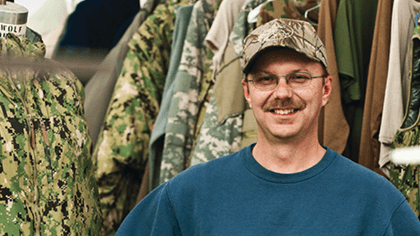
From supplying tactical gear and uniforms to the military to managing supply chains for federal agencies, veterans with disabilities are finding renewed purpose through work that strengthens America’s resilience and response capacity, enabling them to continue to serve their country while building meaningful post-military lives.
SourceAmerica, a national nonprofit that helps create employment opportunities for veterans with disabilities through federal product and service contracts, provides resources and support to a network of more than 300 nonprofit agencies that employ thousands of people with disabilities nationally.
“SourceAmerica is a national nonprofit that administers the AbilityOne Program – a program that creates employment opportunities for people with disabilities, including veterans, through federal product and service contracts,” said SourceAmerica President and CEO Richard Belden.
Belden said AbilityOne employees, including over 2,700 veterans, provide essential services to support the nation’s military and other federal agencies.
“And, these employees manufacture critical products made in America, including military uniforms, extreme cold weather clothing systems, fire-retardant personal protective gear, medical kits and supplies, food products, American flags, and more for military personnel,” he said.
Belden said the AbilityOne Program is one of the nation’s largest sources of employment for people who are blind or have significant disabilities, including veterans.
“It’s an economic driver in communities nationwide and generates cost savings for the federal government,” he said. The average return on investment is $2.66 for every $1 spent to administer the AbilityOne Program.
Veterans receive support from the moment they start looking for a job in SourceAmerica’s network, according to Belden.
“That includes resume and employment resources, training, counseling services, and more,” he said. “Our network of nonprofits connects veterans with disabilities to a variety of job options such as administrative services, product packaging and manufacturing, contact center and IT services, record and document management, facilities management, and more.”
The numerous job options also offer veterans an opportunity to continue supporting military readiness while offering career growth, competitive pay, benefits, and support services, added Belden.
“One veteran, who brought his IT experience from the military to a role at Peckham Industries, said it was comforting when he joined and immediately learned they have a veterans support group,” he said.
Belden stressed that hiring a disabled veteran is a win-win, both for the veteran and the company they work for.
“Veterans bring unique skills to the workforce with leadership, adaptability, and specialized training,” he said.
For example, Andres Rugerio brought valuable military insights to the Defense Manpower Data Center Support Center at Fort Knox, Kentucky, where his team provides technical support to more than 2.8 million members of the military.
“He uses his determination and ability to find a solution to anything to help his
customers and motivate his coworkers,” added Belden.
Employment through the AbilityOne Program gives veterans with disabilities a chance to support their families, provides career advancement opportunities, and uses their skills, while strengthening the economy and supporting the military.
“It also generates federal tax revenue and reduces government spending on assistance programs,” he said.
Belden reminded veterans with disabilities who are looking for meaningful post-military careers that they have a lot to offer employers.
“Your adaptability, specialized training, and mission-driven mindset are incredibly valuable and adaptable to the civilian workforce,” he said. “You have the skills to be successful in your next career and there are options to continue supporting the military.”
Reach Julia LeDoux at Julia@connectingvets.com.
